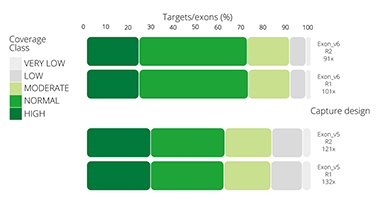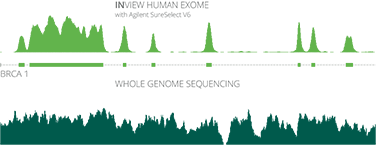Extract profound knowledge. Unlock your exome.
INVIEW Human Exome Advance combines the latest technologies with upstream and downstream automation to provide a complete, pre-designed package with robust stability and enhanced efficiency.
Extract profound knowledge for a wide variety of variant-analysis studies including single-nucleotide variants, structural variants, copy-number variants and delicate tumour profiling. INVIEW Human Exome Advance offers great flexibility in terms of data output and delivery time, depending on your needs. The all-in-one human exome sequencing service includes quality control, library preparation and next-generation sequencing using Illumina Sequencing technology. Regarding bioinformatics, INVIEW Human Exome Advance can be complemented with QIAGEN’s Ingenuity® Variant Analysis™.
Highlights
- Improved coverage of hard-to-capture regions
- Optimised protocol for superior, uniform exome coverage
- Whole-exome sequencing under diagnostics standards (ISO 17025)
- Guaranteed sequencing amount in multiples of 30x
- Rapid variant detection and prioritisation of variants with QIAGEN‘s Ingenuity® Variant Analysis™
First-rate data quality, analysis and security offered by INVIEW Human Exome Advance
- GATC fully automated production under diagnostic standards
- Established know-how and expertise
- Delivery of .vcf files ready for QIAGEN’s Ingenuity® Variant Analysis™
- Comprehensive Data Analysis Report including raw data for your own analysis tools
- ISO 17025 accredited
Highly flexible sequencing service for INVIEW Human Exome Advance
- Individual batch size starting with one sample
- Guaranteed on-target coverage in steps of 30x depending on your needs
- Protocols for various sources

Figure 1: Latest GATC Biotech exome enrichment strategy based on Custom Automation produces maximised variant information output and coverage uniformity. Compared to the former V5 design, using Agilent SureSelect V6 for target capturing, considerably reduces the proportion of under- and over-represented enriched targets. Proportion of targets with normal capture efficiency thereby is enlarged significantly. R1 and R2 are replicates of the experimental design.

Figure 2: Comparison of whole-exome sequencing and whole-genome sequencing (WGS). Coverage profile of BRCA1 exons is displayed as an example for showing the effect of deeper sequencing on increased target capture, leading to exceptional coverage uniformity across the entire exome. With its notably deeper coverage, compared to WGS, the assay is preferably used for analysis of inherited and somatic diseases with locus and allelic heterogeneity.
Learn more about the InView Human Exome Advance
Starting material
- At least 100 ng double-stranded, purified, high-molecular-weight, RNA-free DNA (concentration ≥ 1 ng/µL; OD 260/280 ≥ 1.8; OD 260/230 ≥ 2.0), at least 200 ng per sample for DNA from FFPE samples
- DNA isolation available as additional service for tissue, cell, blood and FFPE samples
Please note that only S1-classified material is accepted for DNA isolation ordered online. Please contact us for further information on isolating RNA from material classified as S2.
Specifications
Sequencing platform
Sequencing mode and enrichment method
- 150 bp paired-end sequencing
- Latest Agilent SureSelect Human All Exon V6 Kit (post-capture indexing format)
Bioinformatic analysis
- Fully optimised bioinformatics pipeline for exome variant filtering, annotation and interpretation.
- Highly accurate discovery and annotation of SNPs and InDels, with information including gene ID, amino acid change, functional class and additional statistics relating to genetic variants
- Semiautomatic mapping against a genomic reference
- Targeted region filtering
- Detection of SNPs and InDels
- Annotation of detected SNPs and InDels (using dbSNP)
- Allocation of effects on protein level (using Ensembl)
Deliverables of bioinformatic analysis
- Alignment file (BAM)
- SNP and InDel tables including annotated variants and effects (vcf, tsv, bed)
- Comprehensive Data Analysis Report (pdf)
Bioinformatics analysis using Ingenuity® Variant Analysis
Detection of causative variants from sequencing data
Ingenuity® Variant Analysis™ allows for rapid identification of the most relevant variants in human exome sequencing. A combination of powerful analytical tools and content from the Ingenuity® Knowledge Base™ enables:
- Rapid variant analysis within hours
- Variant prioritisation based on biologically relevant filter criteria
- Variant filtering based on profound data from several cancers, kindred, proband and cohort studies
If you complement INVIEW HUMAN EXOME with QIAGEN’s Ingenuity Variant Analysis, GATC Biotech will provide you with an account and log-in data to QIAGEN’s web-based software platform. Your vcf-files are directly uploaded into this account – ready for analysis. This combination provides an integrated solution for discretely analysing and interpreting your exome sequencing data in order to detect causal variants in sequenced human DNA. Ingenuity Variant Analysis is intended for molecular biology applications and is not intended for the diagnosis, prevention or treatment of disease.
Visit www.ingenuity.com/variants to learn more about the variant analysis services offered. For up-to-date licensing information and product-specific disclaimers, see the corresponding QIAGEN product site. Further information can be requested from support@ingenuity.com
Delivery time
- 30 days for up to 32 samples (excluding additional services)
- Express delivery available: 12 days for up to 16 samples
Additional Information
The exome accounts for ~1% of the human genome and consists of functionally relevant coding regions (exons) which are most likely to cause differences in phenotypes. Exome enrichment is a powerful tool for discovering relevant variations by sequencing only a fraction of the human genome.
Exome analyses provide greater insight into these target regions providing valuable information for the following:
- Disease studies
- Pharmacogenomics
- Pharmacogenetics
- Clinical research
- Genetic predisposition analyses
- Evolutionary biology research (population-based studies within and between populations
When combined with the latest Agilent post-capture enrichment methods, GATC Biotech-specific protocols for fully automated lab workflows allow you to perform advanced exome analysis that provide the following:
- More targeted genes from current annotation databases, including hard-to-capture exonic regions
- Unbiased, deeper sequencing information
- Exceptional coverage uniformity across the entire exome
- Balanced coverage of active genes
Our customers benefit from our expertise with next-generation sequencing and rely on our high quality standard and certifications. INVIEW Human Exome Advance is the result of our customer-driven innovation process in close collaboration with partners from the DKFZ (Deutsches Krebsforschungszentrum) and the NCT (Nationales Centrum für Tumorerkrankungen) in Heidelberg, Germany.
“With INVIEW Human Exome we found the perfect tool for our clinical exome sequencing. High-quality exome sequencing data from GATC Biotech allows us to achieve an average diagnostic success rate of about 70%. The remarkable coverage uniformity retained by the latest chemistry as well as the flexibility in terms of delivery times and the data generated are particularly invaluable for our application in diagnostics. Prof. Dr. Wolfgang Schmidt, Lab head of Neuromuscular Research Dept., Medical University of Vienna, Vienna
ICGC Initiative: Sequencing for the International Cancer Genome Consortium
“…we are continuing this successful collaboration (with GATC Biotech).“
Prof. Dr. Peter Lichter, Head of Molecular Genetics, DKFZ, Heidelberg